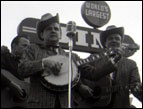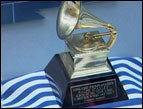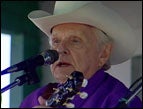Ralph Stanley: A Man of Constant Joy
CBN.com Dr. Ralph Stanley is a man of few words, but his penetrating voice is renown in the world of bluegrass. He has a museum that carries his name. It’s a testament to the man and the music he loves.
Ralph was born and raised in coal mining country in the rugged, Appalachian Mountains of southwest Virginia. He developed a love for singing in the primitive Baptist church. There were no instruments in the church -- just singing. He and his brother Carter learned about music elsewhere.
“We got an old radio in 1936, and we began to listen to different programs. Early Morning, The Grand Ole Opry, and so forth, and we liked it. I believe God gives everybody a talent, and I believe he did Carter and me a talent that we carried on,” says Ralph.
 “I learned to play banjo from my mother. She had an old banjo there, and I liked the sound of it and wanted to learn to play it. So she tuned it up and taught me how to play a tune or two. I went on from there.”
“I learned to play banjo from my mother. She had an old banjo there, and I liked the sound of it and wanted to learn to play it. So she tuned it up and taught me how to play a tune or two. I went on from there.”
With Carter on guitar and vocals, and Ralph pickin’ the banjo, the young brothers played anywhere they could.
“They had pay days for the coal miners,” says Ralph. “They would drop us a quarter or something -- a little donation, and that’d help us buy a Cola. We could buy a coke for a nickel.”
In 1946, Ralph and Carter started their career as The Stanley Brothers and The Clinch Mountain Boys. They started a radio show in Bristol, Virginia. When word spread, they soon played to sold-out audiences wherever they went.
But then the ‘50s came and so did rock ‘n’ roll.
“That just about put all the country, old time music out of business,” he recalls. “Everybody was going rock’n’roll. We just survived.”
Many bluegrass bands called it quits, but Ralph and Carter stuck it out. So when folk music and coffeehouses became vogue in the ‘60s, The Stanley Brothers were back in business.
In 1966, tragedy struck. Carter died from liver disease. While coping with his brother’s death, Ralph was faced with a life-changing decision.
“I really didn’t know if I could make it without him. Inside of three weeks I don’t know how many thousands of phone calls, telegrams I got saying, ‘Don’t quit, keep going. We’ve always been behind you and Carter, and now we’ll be even more behind you because we know you’ll need it.’”
With the support of loyal fans, Ralph Stanley and The Clinch Mountain Boys pressed on. Ralph became one of the biggest names in bluegrass music.
In a career that spans 60 years, he’s performed for everyone from presidents to local farmers. He’s sung about life, death, and everything in between.
 In 2001, Ralph reached an even broader audience through his work on the movie soundtrack O Brother, Where Art Thou. He received two Grammys from that recording -- one of the highlights of his career.
In 2001, Ralph reached an even broader audience through his work on the movie soundtrack O Brother, Where Art Thou. He received two Grammys from that recording -- one of the highlights of his career.
Dr. Ralph Stanley is a living legend. He’s known all over the world and has played with some of the most well known musicians of our time. He’s received hundreds of awards and accolades, including an honorary doctorate degree from Lincoln Memorial University.
But Ralph Stanley’s greatest accomplishment didn’t come while performing on stage. It happened in a river in the mountains of southwestern Virginia. It was there that Ralph Stanley was baptized.
The road had a way of keeping Ralph out of church, but in the end, God had His way.
Ralph recalls tossing and turning in his bed and eventually calling a preacher in the middle of the night. When Ralph told the preacher that he wanted to get baptized, the preacher said, "That's the best news I've ever heard."
At 78, Ralph is still at it. He still performs over a hundred dates a year. That includes the annual Ralph Stanley Bluegrass Festival near his Virginia home.
“I hope the Lord will keep me around a little while longer,” he says. “I will sing as long as He wants me to, and I hope He wants a few more years. A lot of people ask me when will I retire. I’ll retire when He wants me to.”
 Ralph’s legacy will continue. Ralph’s son, Ralph Stanley II, is a recording artist and a Clinch Mountain Boy. His grandson Nathan makes regular appearances with the band on mandolin.
Ralph’s legacy will continue. Ralph’s son, Ralph Stanley II, is a recording artist and a Clinch Mountain Boy. His grandson Nathan makes regular appearances with the band on mandolin.
“First I’d like to thank the Lord for giving me a long life and for giving me the talent,” says Ralph. “I’d like to thank all the fans I’ve sung to and played to all the years. I’d like to be remembered as a man who believed in what He done and always respected his music and his singin’. I always will.”



